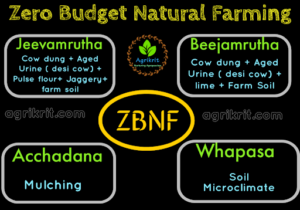About Zero budget natural farming (ZBNF)-
- Zero Budget Natural Farming (ZBNF) is a set of farming methods, and also a grassroots peasant movement, which has spread to various states in India.
- It has attained wide success in southern India, especially the state of Karnataka where it first evolved.
- The movement in Karnataka state was born out of collaboration between Mr Subhash Palekar, who developed it in the mid-1990s in association with state farmers association Karnataka Rajya Raitha Sangha (KRRS) as an alternative to the Green Revolution’s methods driven by chemical fertilizers, pesticides and intensive irrigation.
- The term ‘Zero Budget’ means the zero cost of production of all crops.
- This climate-resilient agricultural method, which is different from organic farming, aims at promoting agroecology and adopting low-cost agriculture practice wherein all critical inputs are gathered from the field and nothing is introduced from outside.
- Under ZBNF, neither fertilizer nor pesticide is used and only 10 percent of water is to be utilized for irrigation as compared to traditional farming techniques.

Four pillars of ZBNF-
Beejamrutham is a fermented liquid consisting of cow dung, cow urine, lime, cereal powder and some soil from the field, which is used for seed treatment.
Jeevamrutha is a fermented microbial culture containing desi cow dung, cow urine, jaggery, pulse flour and a handful of soil from the farm which acts as a catalyst that promotes the activity of microorganisms in the soil.
Mulching with fallen leaves or dried straw conserves the soil moisture and maintains the root temperature at 25-32 degree and enhances the microbial activity.
Waphasa is soil moisture in vapour form which plants are able to absorb.
- The ZBNF method also promotes soil aeration, minimal watering, intercropping, bunds and topsoil mulching and discourages intensive irrigation and deep ploughing.
- ZBNF doesn’t promote vermicomposting as it introduces the most common composting worm, the European red wiggler (Eisenia fetida) to Indian soils. It is claimed that these worms absorb toxic metals and poison groundwater and soil.
- In June 2018, Andhra Pradesh rolled out an ambitious plan to become India’s first State to practise 100% natural farming by 2024.
- As per revised guidelines of Rashtriya Krishi Vikas Yojana, both Centrally-sponsored schemes now allow States to use their funds to promote the ZBNF, vedic farming, natural farming, cow farming and a host of other traditional methods.
















